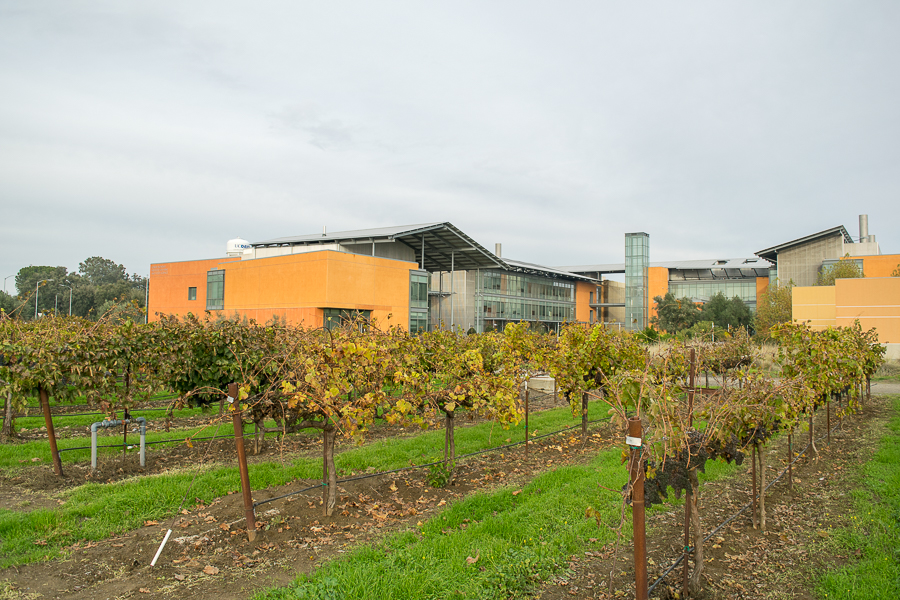
Campus winery aims to remain environmentally sustainable
Due to the passing of state law on Jan. 1, the UC Davis Department of Viticulture and Enology can now avoid pouring student products down the drain — and these high quality bottles of wine won’t be cheap.
The newly-established California law introduced by former Senator Lois Wolk, Senate Bill 683, allows the university to sell its student-produced wine to other wineries for handling.
“[The law] authorizes the Department of Alcoholic Beverage Control (ABC) to issue a special nonprofit sales license to a nonprofit mutual benefit corporation that is associated with the Department of Viticulture and Enology at UC Davis,” the law reads.
The department has been discussing the complex process with campus counsel, but must first get approval from the university to form a nonprofit organization, obtain an official license from the ABC and draw funds from the federal government.
David E. Block, Department of Viticulture and Enology chair, said bachelor’s and master’s students are able to gain a hands-on experience in the department’s wine production lab. To meet the class’ wine excellence standards, the state law authorizes underage students to engage in all aspects of the class, including wine tasting.
The department collects its grapes for wine production classes from the vineyards on campus, from its Oakridge Station in Napa Valley and from donations from companies that value what chief campus counselor Jacob Appelsmith calls the “next generation of winemakers.” Of the 70 to 100 tons of grapes that the department crushes every harvest season, Block said about 250 to 300 different batches of wine are made, which translates to between five and seven thousand gallons per year.
“The plan with the new legislation is to sell most of this wine to the bulk market,” Block said. “It would end up getting sent to other wineries and they would mix it with their wine, package it and sell it.”
Appelsmith said the department will most likely operate with California wineries it currently has connections to through research purposes and grape purchases. According to Block, UC Davis works closely with Silverado Vineyards in Napa Valley to produce wines with similar qualities to those at UC Davis, arriving at its $80 value.
“The $80 bottle of wine is really a function of how good our land is [at] Oakville Station, the quality of grape we’re producing and the quality of wine,” Appelsmith said.
Despite the money involved in the wine market, Appelsmith and Block said it is crucial the department does not have a profit motive and stays true to its ultimate goal of environmental conservation. After all, UC Davis is home to the most sustainable winery in the world and is Leadership in Energy and Environmental Design (LEED) Platinum certified.
“We don’t want to have to just throw the wine away because of primarily the environmental issues and just the general wastefulness of it,” Appelsmith said. “The idea that you would have to take a perfectly good product and pour it down the drain when it has to be treated, is contrary to our mission.”
Block added that it would also be more financially stable for the facility to sell the wine to companies since the department can recover some of the labor, grapes and equipment costs in order to enhance student programs.
Though the arrangements to sell the wine are not yet completed, Block said the department is going to expand the program next year and produce even more red and white wine varieties.
“We’ll be adding another class in the Spring Quarter,” Block said. “[Students] will take the same wines and finish them through everything after the fermentation […] so they can understand how to do all the rest of the steps in the winery from filtration to bottling to cleaning.”
Further developing the program is a step in the right direction, as Block hopes to take advantage of the department’s vineyard and one day even sell a small production of the student wine with a UC Davis label on it.
“It would be very high quality wine that would be up to UC Davis standards,” Block said. “[The wine] would be something students, alumni, faculty and staff could be proud of.”
Appelsmith and Block anticipate finalizing the legal process for the sale of wine by the fall of 2017.
Written by: Jeanna Totah — campus@theaggie.org



